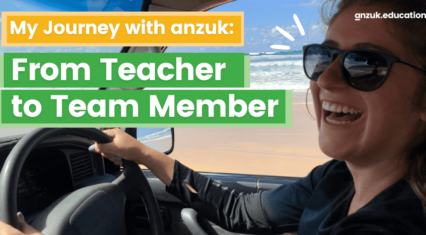Search
Get Started
One teachers’ glimpse into how Melbourne, and teaching, has changed over the decades.
Debra Vlahos, or Terpsihori Vlahos as I recently found out when I interviewed her, is a teacher living and working in Melbourne’s Western Suburbs. When I interviewed her, I got that feeling of more unassuming times, sort of like when you visited your nans house in the country and it smelled like toast or when you’d be allowed to play all day in the neighbourhood and get home at sunset… (with no repercussions).
As the teaching profession changes rapidly from one year to the next, I wanted to get the perspective of a teacher who has taught both Generation X and Y right through to the Millennials. I wanted to find out what Melbourne was like when immigration wasn’t such a big issue as well as get some insight to the changes in the profession over that time.
HJ: Deb, we’re writing a blog with a focus on education related topics and I thought it would be great to have a chat with one of our teachers who has lived and worked in Melbourne for a long time.
DV: Thanks Haydn, I was tickled pink when you called the other day initially and thought of me for this.
HJ: When did your family to Australia and why? DV: My father migrated to Australia in 1956. He brought the family of four over in 1958. I was six years old.
HJ: How many other Greek families were moving to Melbourne at that time? Where were you living?
DV: I am not sure however we moved to Brunswick and around us in the neighbourhood were about six houses owned by Greeks. In each house lived about three or four families. Each family rented a room from the Greek house owner. Every family had certain times to cook, eat and clear the kitchen for the next family. We were lucky dad had bought a little house in Brunswick West and we only had his cousin’s family with us.
HJ: What was Melbourne like when you first moved here?
DV: As a six year old I loved it. The Milk Bar was just down the street. I loved fish and chips and yummy éclairs. School was very difficult as I couldn’t speak English. We arrived in September. After the summer holidays the infant mistress (sort of like an Assistant Principal) taught me on a 1:1 basis. I read John and Betty (This “first reader” for children in a Victorian Primary school was fashioned by the period that it was printed in (1951), and the associated educational principles was applied by the Victorian Educators. It defines the role play of young children, at this point, in their educational development and contained within the (1950’s) “society’s” mores and expectations), and Holidays (this was the “second reader” for Victorian Primary school) over and over again. Then they put me in Grade 3. I had a very Anglo-Saxon teacher. My Greek name is Terpsihori. She could not pronounce it so she asked me to write it on the blackboard. I wrote “Ter” and then she said “that’s ok, we’ll call you Debra” … and Debra it has been since!
HJ: A few weeks ago we put you into Brunswick South West Primary School. You mentioned that when you were a student you went there. How has it changed from then to now?
DV: When I went back I felt strange. The main brick building seems to be the same. Even the principal’s office where I got the strap in grade 5 or 6 was the same. I went and found the infant mistresses office and I couldn’t believe across from her office was the Italian room. How things have changed. Who could have ever thought back then that one day they would be teaching Italian? Italians and Greeks were “wogs” and made fun of and yet today we teach their languages in our schools. From there I went to Princes Hill High School. I always struggled but I have fond memories of my secondary years. I was a great softball player and it helped me get some positive recognition even from form 1.
HJ: How did you come to be a teacher? Most of us teachers have a role model in the education profession who we can remember had some sort of influence on our decision to become a teacher. Who was yours?
DV: I always wanted to be a hairdresser. However, my brother is nine years older than me. When we arrived in Australia he was 15 years old. He went to night school and soon to R.M.I.T and did a fitters and turners course. He took over the father figure in our family because he learnt the language (English). So he used to come to my parent and teacher interviews and read my reports etc. He pushed and pushed me to be a good student and to become a teacher.
HJ: What has been the biggest change that you have seen as a teacher over your career?
DV: I have a retired teacher living next door to me at Dromana (my sons have a house there that we use more than them) and we keep talking about the changes we have seen over the years. Yes technology and all its positives and negatives are probably the major changes. I like the assessment tools available now as compared to my early years of teaching. You know where to start and what you need to do to arrive at the end product. To me however all these things are add-ons if you know what I mean? The most important things in teaching are: the teacher, the student and the parents. All need to work together for the best results. If one is not working properly the train will derail.
HJ: Millennials entering the profession now are teaching in a different climate, to a dynamic demography and with ever changing technologies and pedagogy. What old school advice would give to these graduates just stepping out from the relative safety of their undergraduate confines?
DV: A little of what I said above, but most importantly they need to ask themselves why are they teaching? Do you love what you do? Are you prepared to give up hours of your weekend to be ready for the week ahead? Do you know your students so that you can teach them in the best possible way? Can you be adaptable, flexible and… what’s the word they use a lot today (Alzheimer’s creeping in). Each day at school is never the same and you need to face it with guts.
HJ: I was going to try and pronounce your Greek name to say thanks, but like your first Australian teacher I can’t pronounce it either… so thank you Deb it is.






